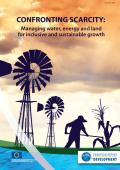A decent environmental quality is a necessary condition for survival of humankind in general and human development in particular. Environmental pollution is a great challenge in developing countries, where especially the poorest are most likely to suffer. Reflecting the state and the dynamics of the environment is essential for science and policy advice. Environmental indicators capture the physical, biological or chemical characteristics of the environment. Environmental composite indicators merge several environmental indicators in order to summarise the multifaceted state of the environment at national level into one single score. These composite indicators allow for cross-country comparisons. The analysis here includes four cross-country composite indicators: the Environmental Vulnerability Index, the Environmental Performance Index, its predecessor the Environmental Sustainability Index and the Ecosystem Wellbeing Index. In addition, the dimension Environmental Wellbeing of the Sustainable Society Index and the Living Planet Index are analysed. Currently, the latter has mainly been constructed at a global scale with only limited availability at national level.
By the end of 2015, the United Nations will adopt a new global development agenda as a follow-up to the Millennium Development Goals (MDGs). To this end, UN member states are now engaged in a debate on defining universal Sustainable Development Goals (SDGs), as decided by the 2012 Rio+20 Summit. According to the final declaration of that summit, these goals should “address and incorporate in a balanced way all three dimensions of sustainable development and their interlinkages” and should “be coherent with and integrated into the United Nations development agenda beyond 2015” (§ 246).
Once again, the international community focuses on the preservation of Amazonian forests, in particular through a bundle of initiatives grouped under the term of REDD+. Initially focusing on reducing carbon emissions, the REDD+ process became increasingly linked with developmental goals that represent the primary interest of all Amazon countries. In consequence, REDD+ can be seen as another attempt to achieve the twin goals of environmental protection and rural development, and consequently, relies on the strategies and tools of past efforts. Against this background, we explore past experiences with key strategies for environmental protection and poverty alleviation in the Amazon to critically reflect about the potential of REDD+ to contribute to sustainable local development in the region. The analysis demonstrates that initiatives that pursued environmental goals mostly led to more restrictions and bureaucratic barriers to local forest users, while the prevailing approaches to promote rural dwellers showed ambivalent environmental outcomes.

There is more to sustainable forest management than reduced impact logging. Partnerships between multiple actors are needed in order to create the institutional context for good forest governance and sustainable forest management and stimulate the necessary local community involvement. The idea behind this is that the parties would be able to achieve more jointly than on their own by combining assets, knowledge, skills and political power of actors at different levels of scale. This article aims to demonstrate by example the nature and variety of forest-related partnerships in Brazilian Amazonia. Based on the lessons learned from these cases and the authors’ experience, the principal characteristics of successful partnerships are described, with a focus on political and socioeconomic aspects. These characteristics include fairly negotiated partnership objectives, the active involvement of the public sector as well as impartial brokers, equitable and cost-effective institutional arrangements, sufficient and equitably shared benefits for all the parties involved, addressing socioeconomic drawbacks, and taking measures to maintain sustainable exploitation levels.
